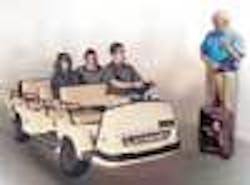You are probably familiar with those obnoxious beeping electric carts that move passengers around airline terminals. Atlanta and LAX are two of the worst offenders, with carts sounding that irritating beeping to warn passersby of their coming. Always happens when I am on my cell phone.
Well, I noted while passing through Dallas/Fort Worth (DTW), that American Airlines has instituted a change. It seems they too found the incessant beeping annoying, as did their customers, and it was observed that frequent flyers, accustomed to this noise, were mentally tuning it out, causing the cart operators to have to shout to get their attention prior to running them down.
On their own, American turned off the beepers, and some semblance of quiet descended on a busy major airport. Score one for the airline. In all fairness I should also point out that the airport management helped out some by installing Skylink, a people mover that reduced the need for many of those electric carts.
So, during my recent visit to DTW, I am trying to catch up on my e-mail, when in the distance I hear a “beep beep.” But it’s not that raucous electronic beep; it’s a soft but distinctive mini-beep. I look up and see a cart approaching with the driver leaning forward, cupping a closed fist to his mouth, as he sounded the “beep beep” warning. Talk about being creative.
I contacted DTW press relations who checked out my story and informed me of American’s decision to do away with the annoying warning and rely on the drivers to call out to blocking passengers. My cart driver was just a lot more adaptable, and frankly a lot more entertaining than the others. He got a laugh out of me.
Adaptability, an attribute in today’s global manufacturing environment, is best summed up by the oft heard phrase, “adapt or die” when applied to businesses faced with increasing competition in an Internet oriented world.
I was visiting with the managing director of a laser marking system manufacturer in an Asian country, who apologized for being late to our scheduled meeting, saying that he had to divide his time that morning between me and his engineering team, in order to set a new course for the company’s yet to be introduced solid-state laser marker. I later learned the decision was to stop work on the unit and switch to a fiber laser; a decision based on input received from company sales people just returned from an international trade show where they noted a changing trend in the market.
At lunch I told the American-educated managing director that I was impressed with this rather radical decision, made solely in the morning meeting. His answer, “It was a case of adapt or die.” Not the first time I have heard this nor will it be the last.
American manufacturing companies used to be good at the adapting by rapidly instituting actions to meet changing market needs. In fact we were known around the world for this adaptability, flexibility, and market responsiveness. We exported much of that spirit offshore, and it now goes by the name of global competitiveness.
I’ll be interested to hear about outstanding situations where U.S. manufacturers have shown some old fashioned adaptability. Beep beep.
About the Author

David Belforte
Contributing Editor
David Belforte (1932-2023) was an internationally recognized authority on industrial laser materials processing and had been actively involved in this technology for more than 50 years. His consulting business, Belforte Associates, served clients interested in advanced manufacturing applications. David held degrees in Chemistry and Production Technology from Northeastern University (Boston, MA). As a researcher, he conducted basic studies in material synthesis for high-temperature applications and held increasingly important positions with companies involved with high-technology materials processing. He co-founded a company that introduced several firsts in advanced welding technology and equipment. David's career in lasers started with the commercialization of the first industrial solid-state laser and a compact CO2 laser for sheet-metal cutting. For several years, he led the development of very high power CO2 lasers for welding and surface treating applications. In addition to consulting, David was the Founder and Editor-in-Chief of Industrial Laser Solutions magazine (1986-2022) and contributed to other laser publications, including Laser Focus World. He retired from Laser Focus World in late June 2022.
